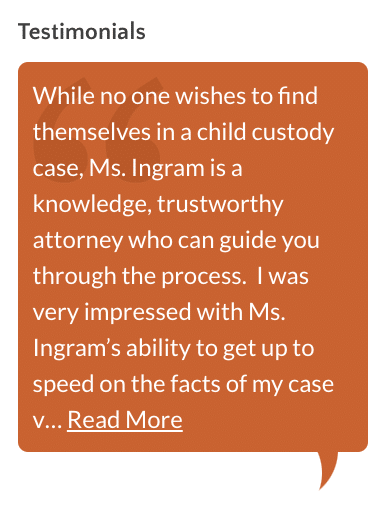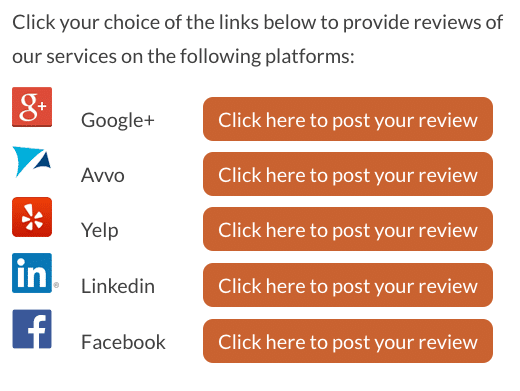Menu
August 18th, 2017
In our recent series of posts on using client testimonials on your law firm's website, we've established that testimonials are an effective client outreach and retention tool and that state rules of professional conduct overwhelmingly permit lawyers to promote testimonials. But what about when the rubber hits the road: how do you actually get your clients to take the time to write you a glowing review?
How Do I Ask for Client Recommendations?
If you feel a bit uncomfortable asking your clients for testimonials, you're not alone. Most of us shy away from boasting about ourselves, let alone from asking someone else to tell us how great we are. Indeed, the more reputable you are, the more you probably feel your work should just speak for itself.
But, consider this: as an attorney, a good deal of your work product consists of satisfied clients. The law, at heart, is not really about writing awesome briefs or the number value of a verdict or settlement. It is about making people whole, protecting their rights, defining their relationships, and improving their personal or professional lives. This is why prospective clients value testimonials — testimonials show that other people in a prospective client's situation selected you and felt that you offered excellent representation. Indeed, our data shows that testimonials are in the top three most clicked-on pages on a law firm website, coming after only the homepage and attorney profile.
As we discussed in our prior post (in the section on Benefits Re: Existing Clients), the process of requesting testimonials can further be both a natural element of your professional networking and a positive way to reconnect with past clients — who are some of your best potential sources of future work.
So, the keys to getting over discomfort in asking people to talk you up are: make it an extension of the relationships you are already committed to maintaining or developing, and do it in a way that is consistent with your character. It's all in the approach.
Sample Testimonial Request Language — And the Two-Step Approach
To this end, The Modern Firm has some sample testimonial request language we offer as a starting point. We recommend that firms personalize the language as appropriate. We find it is helpful to give people concrete questions to answer, which is easier for the writer than coming up with something out of the blue. We've come up with a couple variations to get you started, based on your type of practice or clients.
Doing the Two-Step: Importantly, the language below assumes you have already reached out to the given client to see if they are willing to write a testimonial for you. This two-step approach is ideal: ask them in person, on the phone, or in an initial, shorter email if they would be willing to write a testimonial for you. This allows you to connect with them, first, and asks them simply for a yes or no answer rather than putting them on the spot immediately to take the time to write up their comments. Then, when you follow up with the sample language below, you can begin by re-asserting that they've already agreed to do this for you, which both allows you to offer your thanks-in-advance and is a strong motivator for someone to actually put their pen to paper.
Sample Testimonial Request: Consumer
Thank you for offering to take a few minutes to write up a short testimonial about how I helped you with your case. We are updating the law firm website and, as you can imagine, a chance to read about other people's experiences is extremely helpful when choosing a lawyer.
If it's useful for you, here are a few questions you can answer to help you think about your experience:
- Why were you looking for a lawyer and why did you choose me over other attorneys?
- What were some specific actions or ways I helped you?
- What else would you say to someone who was looking to hire me?
I welcome your thoughts and your input. If you'd like your testimonial to remain anonymous, please let me know. And, as always, if you need anything else don't hesitate to ask.
Sample Request: Business
Thank you for agreeing to write up a brief recommendation for me based on your work with my firm. I am updating the law firm website and, as you can imagine, a vote of confidence from someone such as yourself greatly helps add legitimacy to a law firm website.
If it's helpful, here are a few questions you can answer to help you think about your experience:
- Was there a particular element of our approach that benefitted you most?
- What were some specific actions we took or ways we helped you?
- What else would you say to someone who was considering hiring us?
Please also let me know how you'd like the recommendation attributed — obviously name, title, company is most helpful, but I'm happy doing whatever makes you most comfortable.
I look forward to your response. And, as always, if you need anything else don't hesitate to ask.
Get permission! Although our sample language makes it clear that a person is offering their comments for use on your website, you may also want to include a checkbox or additional line before the client's signature asking them to confirm that it is okay for you to publish their comments.
Do I Have to Name Names, or Are Anonymous Reviews OK?
Testimonials can be attributed with whatever amount of information is comfortable for you and your clients. A full name and location are great — and full information like this is generally the best way to go for sophisticated / B2B practices. But just initials or generic attributions are also okay where appropriate. For anonymous attributions, you need to balance, on one hand, the fact that they may hold less weight with, on the other hand, your former clients' comfort and potential clients' expectations of privacy. Indeed, for some practices, even potential clients may appreciate that you don't name names at all.
Some examples, from full information to totally anonymous — some with details that personalize the review, making it relatable for similarly-situated clients, without revealing the client's identity:
- Jim Summers, CEO of ABC Business, Detroit
- Ted Simms, Detroit
- Stella, Ann Arbor
- A.M., Ann Arbor
- Divorce Client, Ann Arbor
- Former Divorce Client, Mother of 4
- Client Injured by Negligent Semi-Truck Driver
- Divorce Client
- Former Client
- Anonymous
How Many Testimonials Should I Get?
We recommend at least 5 testimonials when your website launches. Of course, more is better! And it's great if you can keep adding over time.
What Gets the Best Results: Email, Postal Mail, or In Person?
These days, email is fine except for practices where your clients are not accustomed to it. That said, as noted above, it's good to use a two-step approach, whether step one is by email or in person. If you're following up by postal mail, include spaces after the questions you pose so that a client can fill in the blanks. And of course include a self-addressed stamped envelope so they can easily send it back.

Finally, in a few instances, it may be appropriate to allow clients to dictate their comments to you or your staff — such as elderly clients or those for whom literacy or writing in English poses a challenge. The key here to is avoid pressure! Ensure the person is genuinely interested in giving you a positive review and, when possible, have a staff member or other member of the firm, rather than the primary attorney on the case, actually do the dictation. Then, of course, have that firm member make the most of the interaction: it can be a really positive experience for the client to recount their appreciation and for your firm to confirm that you genuinely value the client's opinion.
Other Considerations — And Ethical Limitations
There are a few questions we get about soliciting law firm testimonials that really require you to refer to your rules of professional conduct governing attorney advertising. Please see our recent article on attorney ethics rules related to client testimonials for the full scoop. (And, as we remind you there: please read your rules and consult your bar, if necessary, before taking action: don't rely solely on the advice of any website developer, including us.) A few highlights:
What If My Clients Want Me to Draft their Testimonials for Them?
Many of our website design clients say their loyal contacts don't have time to draft up glowing testimonials — but that they're more than willing to sign something drafted for them, law-school-recommendation-letter-style. To our knowledge, most bar rules are silent on this prospect (which, frankly, makes plenty of sense: as long as a client is willing to sign their name and fully endorse something after reading it, where's the problem?). But beware of jurisdictions like Florida, for example, which prohibits a lawyer from displaying a testimonial that has been "written or drafted by the lawyer" (Rule 4-7.13(b)(8)(D)).
Does a Client's Matter Have to be Closed Before They Can Offer a Testimonial?
Again, many bar rules don't address this question — at least not directly. At issue primarily are more general confidentiality and attorney-client relationship issues. I.e.: it's all in what the testimonial says. That said, some jurisdictions do touch on the question. For example, New York requires that, if a testimonial is given by a client whose matter is still pending, the client must give informed consent in writing (Rule 7.1(e)(4)).
Can I Offer an Incentive to Encourage Client Feedback?
Surprisingly, many bars implicitly permit you to offer value (a gift card, credit toward a client's account, whathaveyou) in exchange for testimonials, as long as you identify the testimonial as a paid endorsement. E.g. Georgia (Rule 7.2(c)(3)), Louisiana (Rule 7.2(c)(1)(H)), Missouri (Rule 4-7.1(h)), Montana (Rule 7.1(h)), New York (Rule 7.1(c)(1)), Pennsylvania (Rule 7.2(e)), South Carolina (Rule 7.1(d)(2)), South Dakota (Rule 7.1(c)(13)), and Wisconsin (Rule 20:7.1(d)). Florida, for one, ain't among them (see Florida Rule 4-7.13(b)(8)(E)).
Keep Getting that Feedback Even After Your Website Goes Live
Now, a final point. It is a very good practice to keep seeking client feedback long after your new website goes live. A benefit of doing so is being able to regularly update the testimonials section of your site with fresh praise. But, that benefit is arguably secondary.
Seeking client feedback at the close of a matter allows you to strengthen relationships and keep your finger on the pulse of your client base's impressions of what's working about your practice — and what's not working. Asking for feedback thus allows you to improve customer service, show your clients their opinions are valued and, relatedly, address any bad experiences of which you were not aware. Reaching out personally to a dissatisfied client, if even just to hear them out, is always preferable to being surprised later by a publicly visible 1-star review on Google or Avvo.
So, make seeking client feedback a part of your administrative process for closing a client's file. For example, The Modern Firm offers our website design clients a private online form they can ask a client to complete that allows for quick and easy feedback, which gets emailed directly to the firm. We also work with our law firm marketing clients to create strategies for collecting and managing feedback, including online testimonial request forms and custom-designed review pages that make it easy for clients to review a firm on Google, Avvo, LinkedIn, Facebook or elsewhere with the click of a button.
Categories: Question of the Week
Tags: Reviews & Testimonials






